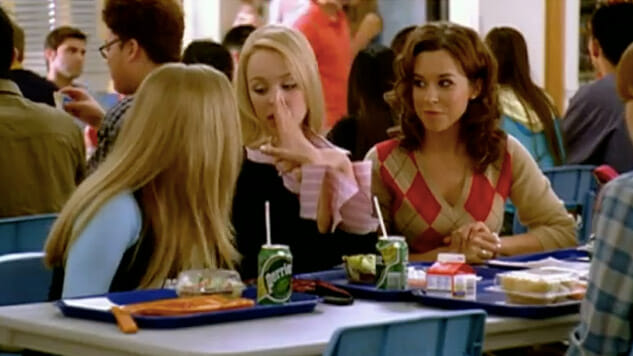Fetch Happens: The Language of Identity Politics in Mean Girls
With Tina Fey's birthday on Friday and the Broadway show garnering 12 Tony nominations, we look back at the freshness of her original film's script.

Before Tina Fey got stubborn—before sometimes thoughtful critiques of her occasionally limited perspective encouraged he reactionary, heel-in-ground attitude about the politics of identity and changing social norms—she was one of the most thoughtful writers and creators to engage with both of those subject matters, and how we talk about them.
A crucial part of what made 30 Rock one of the smartest sitcoms in history was its investigation of what we talk about when we talk about identity politics. From Jenna Maroney (Jane Krakowski) and Tracy Jordan (Tracy Morgan) arguing about who has it worse in America ([white] women or black men?), to Liz Lemon’s frequent struggles to “have it all” (“Murphy Brown lied to us!!”), to the way Jack Donaghy (Alec Baldwin) goads Liz with his conservatism, 30 Rock understood that identities (political, racial, sexual, etc.) don’t exist in a vacuum.
A lot of that sharpness has its origins in Fey’s 2004 screenplay debut, Mean Girls, a dark comedy in the vein of Heathers and Clueless, scrutinizing the social dynamics of high school and, in particular, how young women treat one another and themselves. Through the eyes of new kid, formerly homeschooled Cady Harron (Lindsay Lohan), the film submerges the audience in the nasty politics of “girl world” as she tries to make friends, schemes against the popular girls, and loses sight of herself in the process. Adapted from Rosalind Wiseman’s nonfiction book Queen Bees and Wannabes: Helping Your Daughter Survive Cliques, Gossip, Boyfriends, and Other Realities of Adolescence , Mean Girls has its own unique edge apart from 30 Rock, not just as a high school movie, but as a movie that dives into the operations of hierarchical systems. And for Fey, language is the key to unlocking how these high school cliques work.
Fey’s lauded for her film’s memorable lines (quotes like “stop trying to make fetch happen” and “too gay to function” live on, at least in meme form), but Mean GIrls is an impressive example of translating Rosalind WIseman’s nonfiction, sociological approach into narrative and fictive application. When Janis (Lizzy Caplan) and Damien (Daniel Franzese) introduce her to the various lunch room groups, they give her the vocabulary to describe them from then on. Taxonomical breakdowns of high school are almost blasé at this point, but director Mark Waters and Fey give a potency to the language of that social environment. The crudely drawn map that Janis gives Cady transitions into a virtual, nearly interactive tour, with Waters’ camera zooming around, pointing out the different groups: Asian nerds, cool Asians, varsity jocks, unfriendly black hotties, etc. Word turns into image turns into representation, like a catty version of “The Treachery of Images.”
-

-

-

-

-

-

-

-

-

-

-

-

-

-

-

-

-

-

-

-

-

-

-

-

-

-

-

-

-

-

-

-

-

-

-

-

-

-

-

-








































